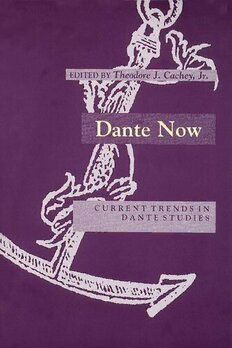Download Dante Now: Current Trends in Dante Studies PDF Free - Full Version
Download Dante Now: Current Trends in Dante Studies by Theodore J. Cachey Jr. (editor) in PDF format completely FREE. No registration required, no payment needed. Get instant access to this valuable resource on PDFdrive.to!
About Dante Now: Current Trends in Dante Studies
Written by ten distinguished Dante scholars, the essays in Dante Now represent the most significant areas of contemporary Dante studies. This collection, originating from a 1993 University of Notre Dame conference, includes some of the particular on three intensely cultivated areas of Dante studies: poetics, "minor works,"and reception.The stimulating ferment on the problem of Dante's poetics is well represented in the first three essays. These range in approach from the stylistic-ideological treatment of Zygmunt G. Baranski's essay to the inter-and intra-textual concerns presented by Christopher Kleinhenz, to the compelling hermeneutical and epistemological reflections on Dante's poetics given by Giuseppe Mazzotta. Dante's so-called "minor works" have increasingly become a focus of attention in contemporary Dante studies, and the textual problems represented by the Vita nuova are sweepingly reconsidered by Dino S. Cervigni and Edward Vasta. Ronald L. Martinez dedicates a substantial essay to Dante's poem of exile "Tre donne," and Albert Russell Ascoli addresses the issue of the relationship between Dante's Commedia and the minor works, especially the Monarchia. The final section of essays examines the phenomenon of the original and continuing vitality of Dante's work as a profoundly of influential, enduring, and enlivening literary classic. R.A. Shoaf addresses the literary influence of Dante in medieval England; Kevin Brownlee investigates Dante’s most important medieval French connection in the works of Christine de Pizan; and Nancy Vickers illuminates Dante's translatability into avante garde films and videos. Finally, Brian Richardson considers the Commedia's Fortunes during the Renaissance in terms of its remarkable editorial and publishing history.
Detailed Information
| Author: | Theodore J. Cachey Jr. (editor) |
|---|---|
| Publication Year: | 1995 |
| ISBN: | 9780268008796 |
| Pages: | 306 |
| Language: | English |
| File Size: | 23.03 |
| Format: | |
| Price: | FREE |
Safe & Secure Download - No registration required
Why Choose PDFdrive for Your Free Dante Now: Current Trends in Dante Studies Download?
- 100% Free: No hidden fees or subscriptions required for one book every day.
- No Registration: Immediate access is available without creating accounts for one book every day.
- Safe and Secure: Clean downloads without malware or viruses
- Multiple Formats: PDF, MOBI, Mpub,... optimized for all devices
- Educational Resource: Supporting knowledge sharing and learning
Frequently Asked Questions
Is it really free to download Dante Now: Current Trends in Dante Studies PDF?
Yes, on https://PDFdrive.to you can download Dante Now: Current Trends in Dante Studies by Theodore J. Cachey Jr. (editor) completely free. We don't require any payment, subscription, or registration to access this PDF file. For 3 books every day.
How can I read Dante Now: Current Trends in Dante Studies on my mobile device?
After downloading Dante Now: Current Trends in Dante Studies PDF, you can open it with any PDF reader app on your phone or tablet. We recommend using Adobe Acrobat Reader, Apple Books, or Google Play Books for the best reading experience.
Is this the full version of Dante Now: Current Trends in Dante Studies?
Yes, this is the complete PDF version of Dante Now: Current Trends in Dante Studies by Theodore J. Cachey Jr. (editor). You will be able to read the entire content as in the printed version without missing any pages.
Is it legal to download Dante Now: Current Trends in Dante Studies PDF for free?
https://PDFdrive.to provides links to free educational resources available online. We do not store any files on our servers. Please be aware of copyright laws in your country before downloading.
The materials shared are intended for research, educational, and personal use in accordance with fair use principles.

